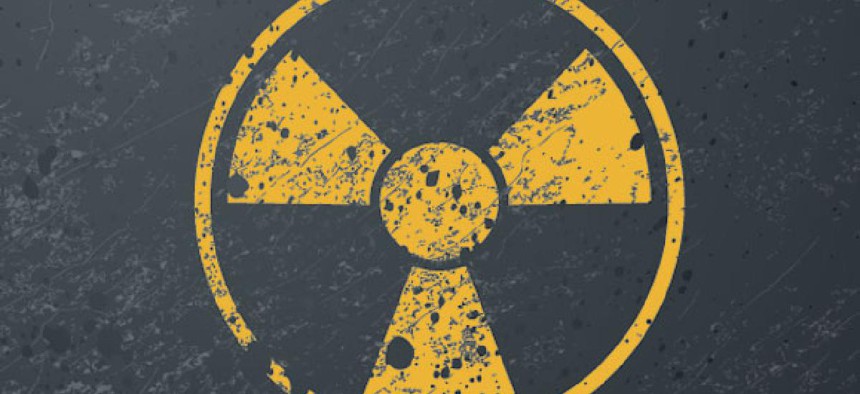Decision on proliferation assessments pending at nuclear agency

rodho/Shutterstock.com
Nuclear Regulatory Commission is poised to consider whether to begin requiring license applicants for emerging technologies.
The Nuclear Regulatory Commission is poised to consider whether to begin requiring license applicants for emerging technologies to evaluate any associated proliferation risks, following the submission of a staff paper on the matter late last month, according to officials.
The five NRC commissioners might debate the viability of a rule-making change -- spurred by a 2010 petition from the American Physical Society -- alongside a potential review of the agency’s September approval of the first U.S. commercial license for using lasers to enrich uranium, as timing would have it.
Proliferation concerns surrounding a proposal by energy giant GE-Hitachi to build a laser enrichment facility in Wilmington, N.C., initially prompted the nation’s oldest organization of physicists to submit the rule-change petition two years ago.
Reform advocates have argued that although existing NRC license application reviews focus on plant security, they do not adequately address broader proliferation dangers.
For example, they say, U.S. approval for laser enrichment -- which is believed feasible in small facilities using minimal electricity -- could spur new clandestine research and construction in other nations that might make bomb-building efforts by nuclear-arms aspirants easier to conceal.
Though the pending APS petition and the NRC staff nod for laser enrichment are separate matters, the issues are overlapping, one commissioner said earlier this month. An NRC rule change could demand proliferation assessments for new uranium enrichment or plutonium reprocessing applications, including laser enrichment but also for other technologies or processes yet to emerge, according to supporters.
“It’s a little bit difficult” to “separate out” the question of revisiting the GE-Hitachi license from the “nonproliferation assessment petition,” NRC Commissioner William Ostendorff told Global Security Newswire following a Nov. 5 panel discussion in Arlington, Va. He did not indicate how he might vote on either issue.
Commission debate over the rule-making proposal is “something that will be coming up … not just focused on the GE-Hitachi technology, but more a policy issue,” he said. “That is one item that will be on our agenda here in the coming months.”
As it stands, NRC reviews of license bids do include a security dimension, albeit without a stand-alone proliferation analysis, he noted.
“There are many technical attributes, security attributes, that our staff does look at that [involve] a nexus of nonproliferation issues,” Ostendorff said. “So it’s a little bit of semantics involved in this issue.”
Under recently revised U.S. regulations, the commissioners have 120 days from NRC staff license approval to revisit the Atomic Safety and Licensing Board’s Sept. 19 findings in favor of the laser enrichment application, if they choose. The consideration period continues through mid-January.
This type of optional review could result in allowing the ASLB decision and subsequent staff license approval to stand as-is, or the commissioners might decide to delay or reject the laser enrichment effort.
GE-Hitachi has said the new technology might allow reactor fuel to be produced at lower costthan does today’s centrifuge approach, and the joint venture has played down the potentialproliferation risks.
Agency spokesman David McIntyre recently described a post-approval review by the five agency commissioners as “rare but not unheard of.”
Ostendorff said early this month that he had not yet seen the staff paper on the APS rule-making petition. Both that issue and the possibility of revisiting the laser enrichment license approval would be subject to a majority vote among the five NRC commissioners, he noted.
Late last week, McIntyre said he had no information about the timing of any meeting the commissioners might hold on either topic.
Though the NRC staff’s Oct. 29 paper remains under wraps, it was widely expected to recommend that commissioners reject the idea that the agency must broaden its evaluation of proliferation dangers as part of the licensing process.
Earlier this year, commission staff found that proliferation assessments would be “beyond the scope” of NRC responsibilities, according to an environmental impact statement issued for the laser enrichment license request. The February document also portrayed an agency view that a dedicated analysis of proliferation risks is unnecessary.
The following month, though, a Congressional Research Service memo argued that U.S. law affords the Nuclear Regulatory Commission sufficient authority to conduct proliferation analyses. Part of the NRC mandate, the CRS document said, is to avoid issuing licenses that “would be inimical to the common defense and security or would constitute an unreasonable risk to the health and safety of the public.”
Both Ostendorff and NRC Chairman Allison Macfarlane are believed open to discussing the possibility of newly requiring a dedicated proliferation appraisal for all future enrichment or reprocessing technology license applications. Commissioner George Apostolakis reportedly favors the idea, while fellow panelists Kristine Svinicki and William Magwood are said to have privately expressed some reservations.
“It should go forward because some new technology may have significant proliferation implications, particularly technologies that are hard to detect,” Linton Brooks, a former head of the National Nuclear Security Administration, said in a Monday telephone interview. “The time to be worried about that is in the design phase.”
(Image via rodho/Shutterstock.com)






